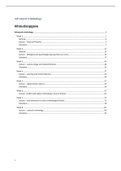Advanced criminology
Inhoudsopgave
Advanced criminology.................................................................................................................................... 1
Week 1..................................................................................................................................................................2
Seminar.............................................................................................................................................................2
Lecture – Classical Theories..............................................................................................................................3
Literature..........................................................................................................................................................7
Week 2................................................................................................................................................................12
Seminar...........................................................................................................................................................12
Lecture – Biological and psychological perspectives on crime......................................................................12
Literature........................................................................................................................................................17
Week 3................................................................................................................................................................26
Lecture – social ecology and cultural theories...............................................................................................26
Literature........................................................................................................................................................32
Week 4................................................................................................................................................................37
Lecture – learning and control theories.........................................................................................................37
Literature........................................................................................................................................................43
Week 5................................................................................................................................................................53
Lecture – digital street cultures......................................................................................................................53
Literature........................................................................................................................................................56
Week 6................................................................................................................................................................61
Lecture- conflict and radical criminology’s (macro theory)...........................................................................61
Week 7................................................................................................................................................................72
Lecture - new directions in critical criminological theory..............................................................................72
Literature........................................................................................................................................................76
Week 8................................................................................................................................................................85
Lecture – cultural criminology........................................................................................................................85
Literature........................................................................................................................................................92
1
,Week 1
Seminar
Routine activity approach
- Environmental factors.
- People move in time and space and these patterns are predictable.
- Risk of victimization depends on:
o Where you go (places you visit).
o What you do (activities you participate in).
- When during their daily routines, people who are motivated to commit crime converge with
suitable victims or targets in the absence of capable guardians, crime is likely to happen.
Rational choice
- It is about goal-oriented offender decision-making. Offenders weigh costs and benefits of
behavioural alternatives. They choose the alternative that is assumed to bring them closer to
their goal.
- Shortcomings: mental issues, feeling of having no choice, why doesn’t everyone engage in
crime?
Biological/psychological theory
- Crime originates because of mental/thought processes that differentiate from non-criminals.
- Different from the other theories: other theories state that everyone is equal. Here the criminal
is someone else than the people who don’t engage in crime.
Social learning theory
- Parents as role models.
- Pro-criminal attitudes, motivations (not directly observing, but the parents have rule breaking
attitudes, kind of creating an environment that’s ok with the criminal environment).
- Differential reinforcement (not a bad thing to commit crime, no punishment).
- Imitation.
Neutralization techniques
- The offender thinks its normal to commit a crime.
- Use of justifications. Let go of mainstream norms and values, justify the crimes.
- E.g.: there is no harm because no physical violation -> justifying the act.
2
,Strain theory
- Cultural goals created by society (e.g., American Dream). The means to achieve these goals
are unequally divided (education, jobs). So, people may resort to crime to achieve that goal.
Sub cultural theory
- When individuals experience a lot of strain -> rebel -> get some sort of status -> own values
and goals, which they can actually achieve.
Lecture – Classical Theories
- What is science?
- What is criminology
- Why do we need criminological theories?
Science
- Knowledge increases.
- Science is systematic, looking for trends.
- Transparency of methods: e.g., systematic observation, experiments.
- Scientific approach of the law.
Criminology
The systematic study of the nature, extent, causes and control of law-breaking and deviant behaviour.
- What do criminologists study?
o The famous American criminologist Edwin Sutherland described the domain of
criminology as follows. Criminology is the science that:
Deals with the establishment of rules and laws, that
Examines who commits such offenses and crimes in what way, as well as
The reactions to them of the government and the population and that
Formulates theories about them.
Empirical research
- Criminology is an applied social science in which criminologists acquire information about
crime based on empirical research.
- Testable hypotheses that are supported or refuted through empirical research.
- This research forms the basis for understanding, explanation, prediction, prevention, and
criminal justice policy.
3
, o Qualitative: intended to understand the meaning of criminal activities or actors
(interviews, participatory observation).
o Quantitative: these methods include figures, counts, and effect of measures (secondary
data analysis, survey research).
Criminology is scientific when:
- Crime or damage (i.e., law-breaking behaviour or norm-breaking behaviour).
- Borrowing theoretical frameworks from other disciplines.
- Influence of policy makers, media, and politics.
- Intellectually simplistic definitions of policy makers.
- Political or media discourse.
- Who pays, decides?
- Independent?
Political and social changes:
Sub conclusion
- Current criminology is moving toward a more inclusive and expansive criminology that views
crime as harm – regardless of regulatory law.
- Comparative and global criminology is moving toward recognising the interconnectedness of
people in different countries and cultures.
Classical period 17th century:
- The idea was that people were born as ‘social types’ with associated rights and privileges such
as status, wealth and power (e.g., landed gentry and serfs).
- Absolute monarchies, and “justice” was arbitrary, barbaric, and very strict.
- Corporal punishment and death penalty was widely used (e.g., the gallows).
- Torture to force a confession.
4





